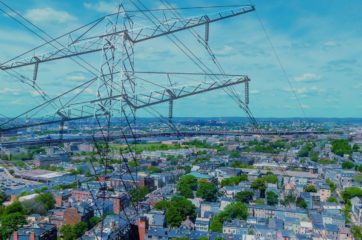by TIM CRONIN

Photo: Bryan Pocius
On Thursday night the New Hampshire Site Evaluation Committee (NH-SEC) voted overwhelmingly to deny a necessary permit to Eversource’s Northern Pass project.
This throws the future of the project, and the larger Massachusetts Clean Energy procurement, into question.
What is Northern Pass?
If built, Northern Pass would be a energy transmission line used to transport 1,200 MW of Canadian hydropower to Massachusetts electricity consumers.
The 192-mile long transmission line would stretch from the Canadian border and down into central New Hampshire. It would end in Deerfield NH, where its energy would interconnect with the Massachusetts electric grid.
The project has been criticized in the past for its effect on New Hampshire’s scenic North Country, and its reliance on hydropower which has damaged ecosystems in Canada.
Last week Northern Pass was picked as the sole winner of the Massachusetts Clean Energy RFP.
N.H. Committee Decision
The NH-SEC’s decision came as a surprise, with all members of the committee voting unanimously to reject the permitting request. Specifically the committee believed that Eversource could not prove that the transmission lines would not ‘unduly affect the orderly development of the region.
Eversource has 30 days to appeal the NH-SEC’s decision, and get a re-hearing before the committee. If the committee denies the utility an appeal then Eversource will have another 30 days to appeal to the Supreme Court.
Future of the Clean Energy RFP
At this time we can not say with complete certainty what the decision means for the Massachusetts Clean Energy RFP.
The litigation that may arise from the NH-SEC’s decision has the potential to derail the Bay State’s timeline for clean energy procurement. The state’s original schedule had the project slated to be fully operational by mid-2020. Delaying the project too long will make it more difficult for the state to achieve its emission reduction goals under the Global Warming Solutions Act.
Of course, state regulators and utility stakeholder may not continue to support the Northern Pass project. The original response saw bids submitted from numerous sources, and it is possible for regulators to switch their support from Northern Pass to a competing bid. If this were to happen, the state would most likely choose another project that imports hydropower from Canada, as these offered the lowest prices.
TDI’s ‘Clean Power Link’ currently has all the necessary permits for construction, and can boast widespread local support in the Lake Champlain region where it would be built. Yet the project is more expensive than Northern Pass. A cheaper option is the competing ‘Clean Energy Connect’ bid located in Central Maine, yet at this time the project has not received any of the needed permits.
Next Steps
In the coming days we will be closely watching to see whether Eversource will appeal, and the outcome if it does.
 TIM CRONIN POLICY ASSOCIATE
TIM CRONIN POLICY ASSOCIATE
Tim assists in coordinating CABA’s Policy Program, and is a young professional with experience in community organizing and state politics. He is currently pursuing a B.A. in Economics at Stonehill College. Tim has previously studied Politics, Philosophy, and Economics (PPE) at Oxford University, and has interned at the State House and in local government. He currently serves as student-body president at Stonehill College where he has continued to fight for sustainable initiatives such as fossil fuel divestment, expanding the college’s solar farm, and reducing food waste. Tim is on the board of a local civic association in his hometown of Weymouth, and is the founder of the community nonprofit Green Weymouth. Tim enjoys reading The Economist, listening to podcasts, and exploring state parks in his free time.








